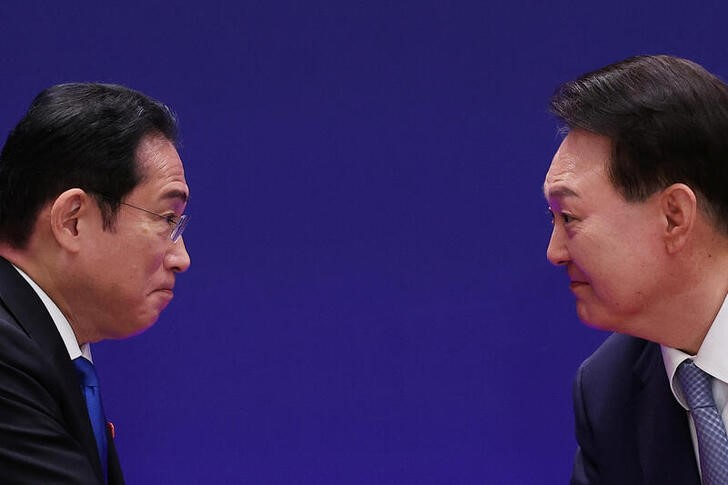By Hyunjoo Jin
SEOUL (Reuters) - Japanese products, from cars to beer, whisky and clothes, have been rising in popularity in South Korea, rebounding from consumer boycotts in 2019 on the back of improving bilateral relations and the cheaper yen.
The monthly sales of Japanese cars, including Toyota Motor and Lexus, jumped 31% in August from a year earlier, taking a boost from rival Hyundai Motor's capacity crunch and consumer preferences shifting away from electric vehicles.
South Korean President Yoon Suk Yeol, who made it a priority to mend ties with Japan since taking office in 2022, will have a summit meeting with Japanese Prime Minister Fumio Kishida in Seoul on Friday.
Sales of Japanese products in South Korea took a battering in 2019 when anti-Japanese sentiment flared after Tokyo imposed export curbs in a row over wartime forced labour. The two countries share a bitter history that includes Japan’s 1910-45 colonization of the Korean peninsula.
A recent survey showed that 57% of South Korean respondents in their 20s and 30s said they have favourable views towards Japan, compared to 10% who said the same of China.
"The public hostility towards Japan has been masked by economic benefits of Japanese products and tours," said Seonglim Lee, a Consumer Science professor at Sungkyunkwan University.
South Korean imports of Japanese beer jumped nearly 70% in the first seven months of this year from a year earlier, while shipments of Japanese whisky rose nearly 50% during the period, Korea Customs Service data showed.
Japanese clothing brand Uniqlo, which was forced to close some of its stores in South Korea since 2019, saw revenue jump 31% in the financial year that ended in August 2023.
Japanese cars account for a small portion of the South Korean market dominated by Hyundai and Kia, but have been expanding sales in recent years.
Japanese carmakers - Lexus, Toyota and Honda which generate most of their sales from hybrid cars - sold a combined 2,527 vehicles in Korea in August, up 31% from a year earlier and 15% from the previous month. In contrast, Tesla (NASDAQ:TSLA), Mercedes and BMW saw their South Korean sales of electric vehicles tumble from July. Hyundai Motor saw its EV sales rise, helped by its new, less expensive models.
An official at Toyota Korea said it had been getting more requests about hybrid vehicles after some recent EV fires, including one involving a Mercedes electric vehicle on August 1.
A Sejong city resident, who asked to be identified only by the name Park, said while he "hates" Japan's national identity, his trust in Japanese automobile technology led him to buy a Toyota Camry hybrid car.
"They are separate matters," he said, declining to give his full name, citing concerns that he could face criticism from some Koreans who don't like Japan.
Maria Hwang, a Seoul resident in her 60s, said she was not worried about public sentiment towards Japan when she bought a Lexus hybrid vehicle in late August.
"I don't want to be dogged by the history," she said.

Hwang also said she travels more to Japan thanks to the cheaper yen.
The number of Korean travellers to Japan surged nearly 40% from a year earlier to a record high of 5.2 million in the first seven months of this year. In 2023, the number of Koreans visiting Japan jumped more than six-fold from the previous year, accounting for the biggest group of foreign visitors to the neighbouring country.
